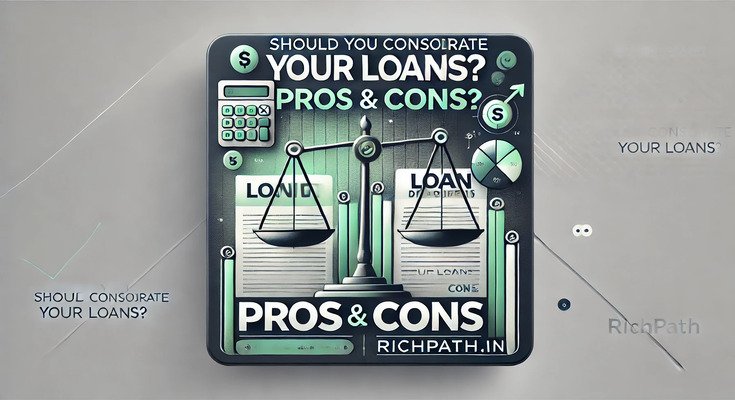
Consolidate Your Loans: A Smart Way to Simplify Debt Management
Managing multiple loans with different due dates and interest rates can be overwhelming. If you’re struggling to keep track of payments, consolidating your loans can be an effective strategy to simplify your finances. But is it the right choice for you? This article explores the benefits and drawbacks of choosing to consolidate your loans, helping you make an informed decision.
What Does It Mean to Consolidate Your Loans?
To consolidate your loans means combining multiple debts into a single loan. This new loan typically comes with a single monthly payment, potentially lower interest rates, and an extended repayment period. Loan consolidation applies to both unsecured debts (like personal loans and credit card debt) and secured debts (like home or car loans).
How Does Loan Consolidation Work?
When you consolidate your loans, your lender pays off your existing debts, leaving you with one new loan to repay. The benefits depend on factors such as interest rates, repayment terms, and your financial discipline.
Ways to Consolidate Your Loans in India
- Personal Loan for Debt Consolidation – Borrowers use a personal loan to repay multiple unsecured debts, such as credit card balances.
- Balance Transfer Facility – Some banks offer credit card balance transfers at lower interest rates, allowing you to consolidate high-interest credit card debt.
- Secured Loan for Debt Consolidation – Borrowers use assets like a home or car to secure a lower-interest loan and repay existing debts.
Pros of Choosing to Consolidate Your Loans
1. Simplifies Repayments
One of the biggest benefits when you consolidate your loans is that you replace multiple payments with a single monthly installment. This makes budgeting easier and reduces the risk of missed payments.
Example:
Raj had three personal loans with different repayment dates. After choosing to consolidate his loans, he only had to remember one payment date, significantly reducing financial stress.
2. Lower Interest Rates
If you have a good credit score, you may qualify for a lower interest rate when you consolidate your loans. This reduces your total interest expense over time.
Example:
Priya had three personal loans with an interest rate of 15% each. By opting to consolidate her loans into one at 10% interest, she saved ₹50,000 over the loan term.
3. Better Cash Flow Management
Extending the repayment period while you consolidate your loans can lower your monthly installments, improving your cash flow and making it easier to manage other expenses.
Example:
Amit had a total debt of ₹2,00,000, which he needed to repay in 2 years. By consolidating it into a 5-year loan, his monthly installment dropped from ₹18,000 to ₹7,000, making it more manageable.
4. Potential to Improve Credit Score
When you consolidate your loans, you reduce your credit utilization ratio and simplify repayments. This can positively impact your credit score over time.
Example:
Neha had high credit card utilization, which hurt her credit score. After choosing to consolidate her loans with a personal loan and making regular payments, her credit score improved significantly.
Cons of Choosing to Consolidate Your Loans
1. Extended Loan Tenure Can Lead to Higher Interest Costs
While lower monthly payments sound attractive, extending the loan tenure when you consolidate your loans can result in paying more interest in the long run.
Example:
Vijay consolidated ₹1,00,000 of credit card debt into a 5-year loan instead of 2 years. While his monthly payment decreased, he ended up paying ₹20,000 more in interest.
2. Additional Fees and Charges
Some consolidation options include processing fees, balance transfer charges, or foreclosure penalties that can reduce the financial benefits.
Example:
Rita used a balance transfer facility to consolidate her loans, but she was charged a 2% transfer fee, which reduced the total savings she expected.
3. Risk of Falling Into Debt Again
Consolidation helps reduce financial stress, but if you continue borrowing without changing your spending habits, you may find yourself in deeper debt.
Example:
Sunil consolidated his credit card debt, but after a few months, he started using his credit cards again. Without proper budgeting, he accumulated new debt, worsening his financial situation.
4. Risk of Losing Collateral
If you consolidate your loans using a secured loan (such as a home loan or loan against property), failing to repay could put your asset at risk.
Example:
Manoj consolidated his debts by taking a loan against his house. When he struggled with repayments, he risked losing his home to the lender.
When Should You Consolidate Your Loans?
Loan consolidation is a smart choice if:
✔ You have high-interest loans and want to save money.
✔ You struggle with multiple due dates and need simplified payments.
✔ You want to improve your credit score by reducing your credit utilization ratio.
✔ You need lower monthly payments to manage your budget more effectively.
When Should You Avoid Loan Consolidation?
You should not consolidate your loans if:
❌ Your current loans already have low-interest rates.
❌ You have poor financial discipline and may accumulate new debt after consolidation.
❌ The fees and charges of consolidation outweigh the benefits.
❌ You cannot afford the repayment terms of the new consolidated loan.
Case Study: How Rekha Benefited by Choosing to Consolidate Her Loans
Rekha, a marketing executive in Mumbai, had:
🔹 Three credit cards with a combined ₹3,00,000 debt at 18% interest.
🔹 A personal loan of ₹1,50,000 at 14% interest.
She decided to consolidate her loans into a single personal loan at 10% interest, reducing her monthly payments and total interest burden. With disciplined payments, she improved her credit score and qualified for a home loan at a lower interest rate in the future.
Conclusion: Should You Consolidate Your Loans?
Deciding whether to consolidate your loans depends on your financial situation. If you can secure a lower interest rate, simplify payments, and stay disciplined with repayments, loan consolidation can be a powerful debt management tool.
However, if you fail to control spending or overlook additional fees, consolidation could lead to higher long-term costs. Always assess the pros and cons before making a decision.
For expert financial insights, visit Rich Path. and start your investment journey today! 🚀
Read more –
Top 5 Mutual Funds for Long-Term Growth in India in 2025
Best Mutual Funds: How to Choose – A Complete Guide
Best Flexi Cap Mutual Funds to Invest in 2025
Disclaimer:
This article is for informational purposes only. Consult a financial advisor before making any financial decisions.



